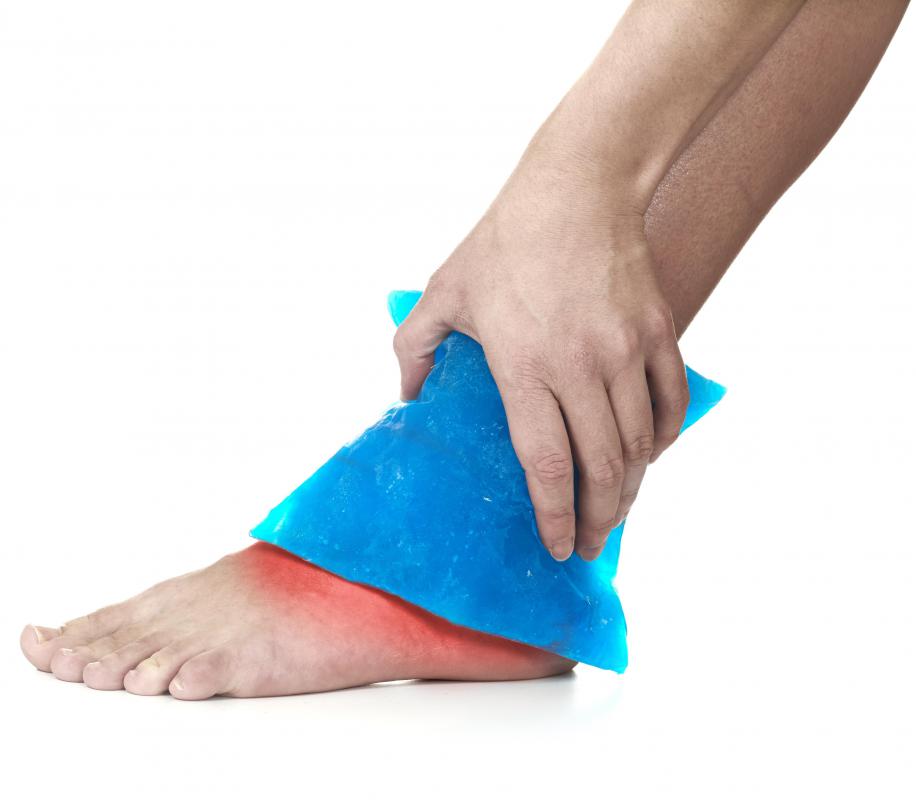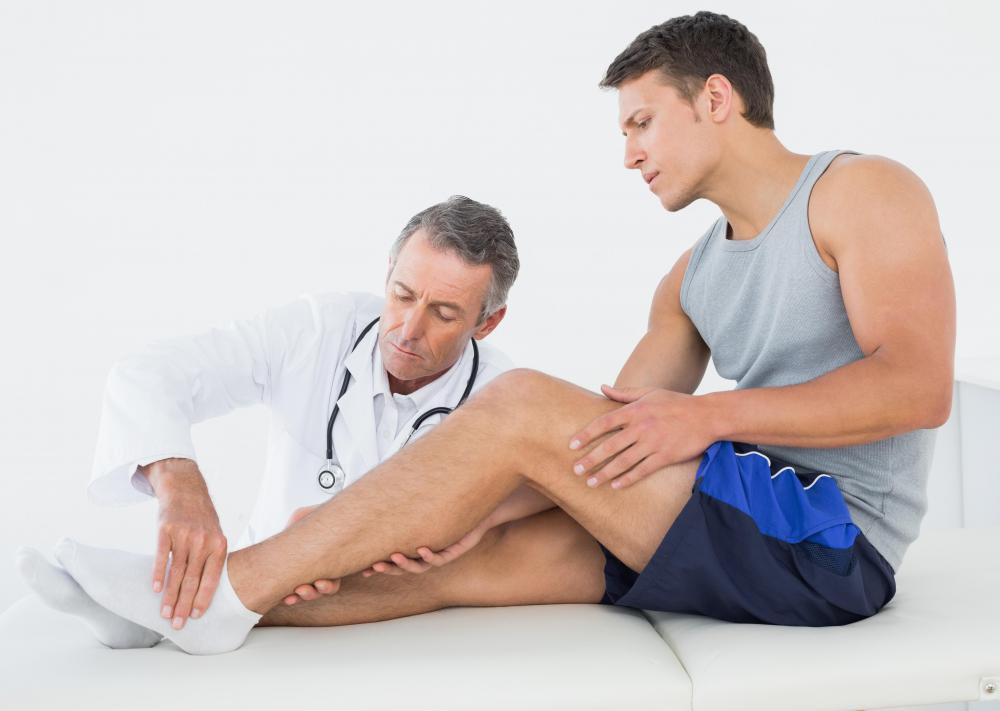At TheHealthBoard, we're committed to delivering accurate, trustworthy information. Our expert-authored content is rigorously fact-checked and sourced from credible authorities. Discover how we uphold the highest standards in providing you with reliable knowledge.
What Causes Puffy Ankles?
Puffy ankles may be caused by an underlying medical condition, such as kidney or heart disease. When a person experiences swelling of the ankles or feet, he should note whether other symptoms are present as well. Diabetes may cause puffy ankles when infection is present. More seriously, blood clots may form on the leg and cause swelling of feet or ankles. This condition not always caused by a medical condition or disease; some cases may be due to obesity or from exerting excessive pressure on the ankle joint.
Sprains often cause puffy and swollen ankles in children and adults. Sprained ankles are a common sports related injury that may produce pain and immobility. Rest, ice and compression may help alleviate the symptoms of a sprained ankle. A physician may recommend an X-ray of the ankle to be sure the bone is not broken.

Some individuals who take steroidal medications such as prednisone, or other non-steroidal anti-inflammatory drugs, may experience puffiness or swelling. Diuretics may also cause edema and swollen ankles. Individuals who take these types of drugs may also notice swelling in other areas of the body, including the face. Modifying the dosage or switching to another medication may improve the situation, but this should be done only with a doctor's approval.

Individuals suffering from dehydration may experience swollen ankles and feet, as do those who consume large amounts of sodium. These are both generally temporary conditions, and once the body becomes hydrated or the person changes his diet to include less sodium, the swelling should decrease. Signs of dehydration include dry mouth and skin, extreme thirst and dizziness.

During the second and third trimesters of pregnancy, some women experience swollen ankles or feet. In most cases, moderate swelling is not serious and will generally decrease after childbirth. To relieve the discomfort of puffiness and minor swelling during pregnancy, it's best to rest and elevate the feet for an hour or two during the day.
For precautionary measures, an individual who who suddenly develops puffy ankles and foot swelling should consult a physician. The doctor will typically perform a physical examination that may include blood work to test for liver and kidney problems. He will also note whether the patient has a history of heart related problems or if there are diabetics in his family.
AS FEATURED ON:
AS FEATURED ON:
















Discussion Comments
@MrsPramm-- Next time you have to travel for long periods of time, take a baby aspiring. The swelling is due to poor blood circulation because you're in the same position without moving your feet for too long. Aspirin thins the blood and improves circulation. It's also an anti-inflammatory so it will help reduce the swelling.
Although this type of swelling is irritating, it's not a very big deal. A good foot soak with some Epsom salt is enough to relieve the puffiness.
@discographer-- I'm not a doctor or expert but I think that if the kidneys are not working properly, the body retains water. Our kidneys are responsible for filtering our blood and eliminating toxins. When they can't do that properly, fluid stars accumulating and my accumulate around the feet or ankles.
Heart problems can have a similar effect because our heart is responsible for blood circulation. And poor blood circulation can cause fluid retention.
I know a little bit about this because my grandfather had kidney failure and experienced this symptom. He was also very tired and he lost weight because he didn't eat as much.
How does kidney or heart disease lead to puffy ankles? Are there other symptoms that will accompany puffy ankles in this case?
@pleonasm - Tell me about it. I hate it when I have to be on a plane or a bus for long periods of time because my ankles and feet always swell up for some reason, no matter how much I try to stretch and walk around. I guess it's sleeping upright that does the damage.
The only time it doesn't happen is if I've got enough room to really curl up so that I can elevate my feet a little bit.
I guess it kind of also brings home that you should be careful about sitting in front of a computer all day, since that's essentially the same position. I always try to go for walks and move around a lot to break it up if I'm doing office work. I'd be very worried about getting a blood clot otherwise, because I know that's a danger on planes and in people who are otherwise sitting still for long periods of time.
@clintflint - I hope you also got your ankle checked by a doctor to ensure it wasn't just a sprain. My sister had what we thought was a sprain for a week before she decided to go to the doctor and discovered that it was actually a hairline fracture.
Sprains can be incredibly painful and fractures can be less painful than people expect, but they still need to be treated.
I've never had anything except swollen ankles from traveling too much and that is pain enough for me.
When I did a first aid course at school, they taught us a way to remember how to treat a sprain. I don't know if it's still used, but it matches what it says in the article. It was RICE, which stands for Rest, Ice, Compression and Elevation.
And I did this myself when I sprained my ankle a couple of years ago. The ice was just a bag of frozen peas wrapped in a towel though and I probably didn't wear my compression bandage as much as I should have.
Post your comments